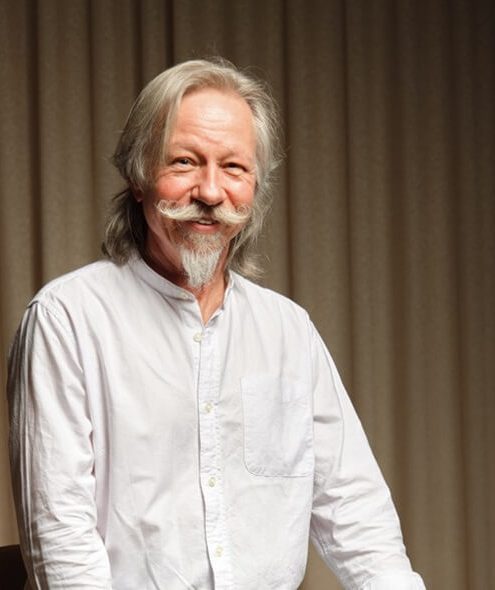Vladimiras Konstantinovas
Vladimiras Konstantinovas (b. 1958 in Šiauliai, Lithuania) is a Lithuanian conductor, choirmaster, composer, and arranger. He studied choral conducting with Professor Kazys Kšanas at the Klaipėda Faculty of the Lithuanian State Conservatory (present Lithuanian Academy of Music and Theatre, 1975–9), where he subsequently taught at the Jazz (1984–91) and Choral Conducting (1985–6) departments. He later polished his conducting skills with conductor Jonas Aleksa as a trainee with the Kaunas State Choir and the Lithuanian National Opera and Ballet Theatre Symphony Orchestra (1980–1), and spent a traineeship at the International Bach Academy Stuttgart (Germany) in 1992.
In 1993, together with Alfonsas Vildžiūnas, he co-founded the Aukuras Choir in Klaipėda, which he led until 1997. With this choir, he toured Germany, Sweden, the Czech Republic, and Italy and won several international competitions in Italy, Switzerland, France, Austria, and Lithuania. As the leader of the Aukuras Choir, he was announced the recipient of the 1995 Stasys Šimkus Award granted by the Lithuanian Ministry of Culture for the promotion of Lithuanian choral music. In 1997, he founded a new vocal ensemble of 16 singers, which presented Lithuanian premieres of the choral pieces by Dietrich Buxtehude, Gottfried Heinrich Stölzel, and Antonio Caldara. Together with this ensemble, he won the Best Conductor diploma at the 38th International Choral Singing Competition “C. A. Seghizzi” in Gorizia, Italy (1999).
From 1976 he served as a concertmaster (later choirmaster) at the Klaipėda People’s Opera. In 1987, he was appointed Choirmaster at the newly established Klaipėda State Music Theatre (KSMT) where he was subsequently promoted to Chief Choirmaster in 1992. In this capacity, he has prepared numerous choral scenes in operas, operettas, and musicals produced at this theatre. He has also prepared and conducted many concert programmes and semi-staged shows, featuring the Lithuanian premiere of Rossini’s Messa di Ravenna, Stravinsky’s Oedipus Rex, Mendelssohn’s Elijah, Honegger’s Jeanne d’Arc au bûcher, Orff’s Carmin Burana, Bach’s Christmas Oratorio, Schütz’s Christmas Story, Gluck’s De Profundis, Requiem settings by Mozart, Fauré, and Verdi, Brahms’s A German Requiem, Britten’s War Requiem, and many other large-scale compositions for soloists, choir, and orchestra.
Among other works, Konstantinovas has conducted the world premieres of his own creations including overture-cantata Klaipėda Fireworks dedicated to the 750th anniversary of Klaipėda (2002), oratorio Requiem Reborn (2005), cantata Songs of the Bridge (2007), and CzechoBalt (2009)—a joint multimedia project between the KSMT orchestra and the Czech ensemble Clarinet Factory, featuring DJ Genys and VJ Eglė Eigirdaitė. His oeuvre also includes an opera for children (Whatever Grandpa Does Will Turn Out Fine, 1981; orchestrated in 1993), a musical (Thumbelina, 2002), music for plays (A Little Tale of Glass, 2001; Hundred Kisses from the Princess, 2002; The Non-Prince of the Not Sad Frog, 2013), works for choir, religious hymns, and music for Michael Lane’s short film Hands (awarded for Best Music at Los Angeles Feedback Film Festival in 2018). His most recent contribution is the prologue, epilogue, and second act to the opera of stories Klaipėda, which was commissioned to four Klaipėda-based composers by the Klaipėda State Music Theatre to commemorate the 100th anniversary of the annexation of Klaipėda Region to Lithuania in 2023. The opera was premiered at the 3rd International Klaipėda Festival.
As an arranger, Konstantinovas has a history of lasting collaboration with the Lithuanian State Symphony Orchestra and has orchestrated classical rock hits for the orchestra’s project The Metamorphoses of Classic Rock (2000–2009). More recently, he has collaborated with the Song and Dance Ensemble Lietuva on several projects, including the orchestration of Jonas Jurkūnas’ collage opera Mažvydas (2020) and the arrangement of Pergolesi’s Stabat Mater (2021) for Lithuanian folk instruments with ‘atmospheric’ interludes of his music.
In February 2025, he was invited by conductor Dante Anzolini to assist him in preparation for the concert at Carnegie Hall in New York entitled “Journey of Faith: A Musical Tribute to Mother Teresa” honouring St. Mother Teresa and her service to the poor throughout the world. Konstantinovas worked with the specially-formed Tribute Chorale, with whom he rehearsed Gabriel Fauré’s Requiem, the US premiere of Vals Hyjnor (Hymn for Mother Teresa) by Genc Tukici, and “XI Paradise” from Philip Glass’s Symphony No. 5.

